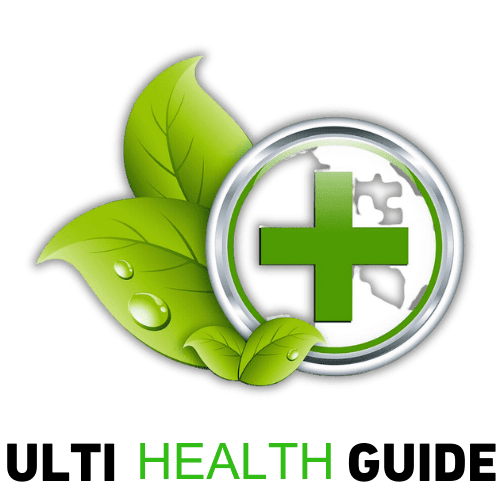What Is A Peptic Ulcer?
A peptic ulcer is a sore that forms in the stomach lining or the first part of the small intestine, known as the duodenum. These ulcers are caused by the erosion of the protective mucus layer that lines the stomach and duodenum, leading to the development of a painful open sore.
The most common cause of peptic ulcers is an infection with the bacteria Helicobacter pylori.
Duodenal Ulcers
The Duodenum is the first part of your small intestine, which absorbs partially digested food from the stomach. The duodenum forms a tiny portion of the gastrointestinal (GI) tract.
Symptoms Of Duodenal Ulcers
- Burning, dull, or gnawing pain in your belly experienced before a meal
- Nausea and vomiting
- Not feeling hungry
- Losing weight
- Vomiting blood
- Black or bloody stools
Esophageal Ulcers
Your esophagus is the tube connecting your throat to your stomach, thus distributing the flow of food through the gastrointestinal tract.
Symptoms of Esophageal Ulcers
- Long-term inflammation
- Irritation of the esophagus
- Discomfort or a burning feeling behind or below the sternum
What Is A Stomach Ulcer?
Stomach ulcers occur when perforations or sores are formed on the stomach lining that cause severe pain.
Stomach Ulcer Symptoms
- Abdominal pain
- Nausea and vomiting
- Loss of appetite
- Weight loss
- Bloating
- Heartburn
- Dark or black stools
What Causes Stomach Ulcers?
- Non-steroidal anti-inflammatory drugs (NSAIDs)
- Excessive alcohol consumption
- Smoking
- Stress
- Crohn's disease, Zollinger-Ellison syndrome, or cancer
What Causes Stomach Ulcers?
- Infection with the bacteria Helicobacter pylori
- Non-steroidal anti-inflammatory drugs (NSAIDs)
- Excessive alcohol consumption
- Smoking
- Stress
- Crohn's disease, Zollinger-Ellison syndrome, or cancer
Treatments For Stomach Ulcers
- Antibiotics
- Medications to reduce stomach acid
- Medications to protect the stomach lining
- Avoiding certain medications
- Lifestyle changes
- Surgery
Acid Reflux? What Foods To Avoid
- Spicy foods
- Fried and fatty foods
- Citrus fruits and juices
- Tomatoes and tomato products
- Caffeine
- Alcohol
- Chocolate
- Peppermint
Foods That Heal Stomach Ulcers
- Fiber-rich fruits and vegetables
- Probiotics
- Honey
- Garlic
- Turmeric
- Herbal teas
- Whole grains


- Zenwise Probiotic Digestive Multi Enzymes, Probiotics for Digestive Health, Bloating Relief for Women and Men, Enzymes for Digestion with Prebiotics and Probiotics for Gut Health - 60 Count

- Amen Leaky Gut Supplements - Advanced Formula with Bioavailable L Glutamine, Zinc, Turmeric, Licorice Root - Bowel and Stomach Probiotics & Fermented Prebiotics - Vegan, Non-GMO - 90 Capsules

- Natural Factors, Chewable DGL 400 mg, Licorice Extract for Healthy Digest, 180 Count (Pack of 1)
Over a million people suffer from Peptic ulcers(gastric ulcers (Stomach ulcers), duodenal ulcers, or esophageal ulcers). These ulcers are painful sores that form on the stomach lining the duodenum, and esophagus. They cause various symptoms, including nausea, vomiting, bloating, discomfort, a burning feeling, gnawing pain, vomiting blood, and black or bloody stools. This blog post will discuss how it feels to have peptic ulcers, the symptoms, causes, and treatments, with our main focus on stomach ulcers.

What is a peptic ulcer?
A peptic ulcer is a sore in the lining of your stomach, esophagus, or duodenum. A peptic ulcer may develop above your stomach in your esophagus. You call this type of peptic ulcer an esophageal ulcer. If you have sores in your small intestine, you call this peptic ulcer a duodenal ulcer. When the peptic ulcer is in your stomach lining, it is called a stomach ulcer.

Peptic ulcer disease
Peptic ulcer disease (PUD) erodes the stomach's inner lining, the gastric mucosa.
PUD can also occur if you have a rare condition called Zollinger-Ellison syndrome (gastrinoma). This condition forms when one or more tumors form in the neuroendocrine cells of your pancreas or your duodenum.
These neuroendocrine cells form large amounts of the hormone gastrin which controls the amount of acid in your stomach. (Acid is needed to digest the food you eat) Too much acid can cause stomach and duodenum (small intestine)ulcers.
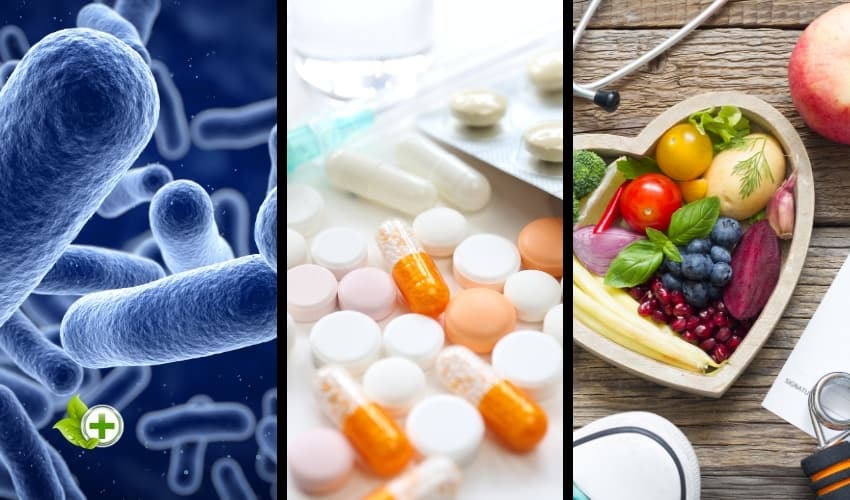
What causes peptic ulcers?
The following are the most common causes:
- Long-term use of ibuprofen and aspirin also known as nonsteroidal anti-inflammatory drugs can incresase your risk of peptic ulcers.
- An infection with the bacteria H. pylori.
- Zollinger-Ellison syndrome is rare cancerous and noncancerous tumors in the stomach, duodenum, or pancreas.
Zollinger-Ellison syndrome(ZES) is a combination of the following:
- Too much acid.
- High levels of gastrin.
- Stomach and small bowel ulcers.

Duodenal ulcers
The Duodenum is the first part of your small intestine, which absorbs partially digested food from the stomach. The duodenum forms a tiny portion of the gastrointestinal (GI) tract.
Sores that go right through (perforates) the wall of the first part of the small intestine (duodenum) are called Duodenal ulcers. They are usually non-cancerous (benign). Partially digested food (from the stomach) leak into the abdominal cavity. This is usually a medical emergency as it causes severe pain.

Symptoms of duodenal ulcers
Symptoms of a duodenal ulcer are burning, dull, or gnawing pain in your belly experienced before a meal. The symptoms occur when excess acid is sent into the duodenum produced by hunger stimulation.
Other symptoms may include nausea and vomiting, not feeling hungry, losing weight, vomiting blood, and black or bloody stools.
To help diagnose a duodenal ulcer, your practitioner will run:
- A physical exam includes using a stethoscope to listen to sounds, checking for bloating and tenderness within your abdomen.
- An pper gastrointestinal (GI) endoscopy that can confirm a duodenal ulcer. In this test, a doctor looks inside your stomach and the first part of your small intestine (duodenum) with a flexible tube, light, and camera called an endoscope. This is done by passing a thin line down your esophagus.
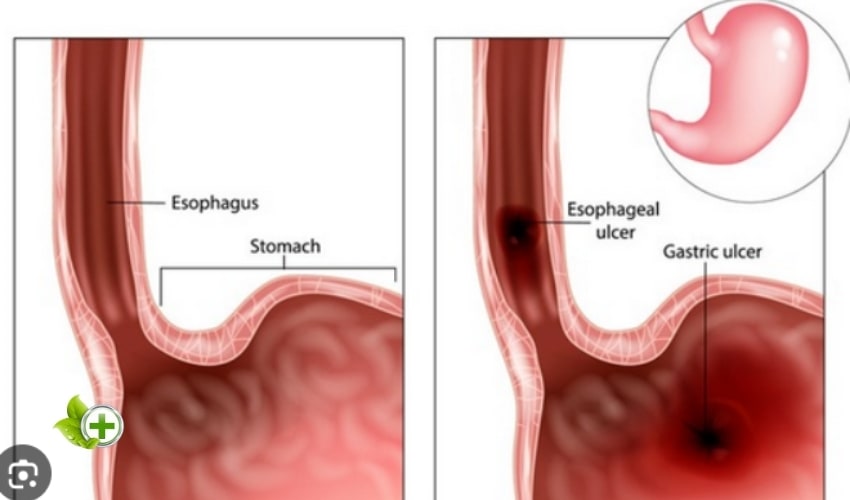
Esophageal ulcers
Your esophagus is the tube connecting your throat to your stomach, thus distributing the flow of food through the gastrointestinal tract.
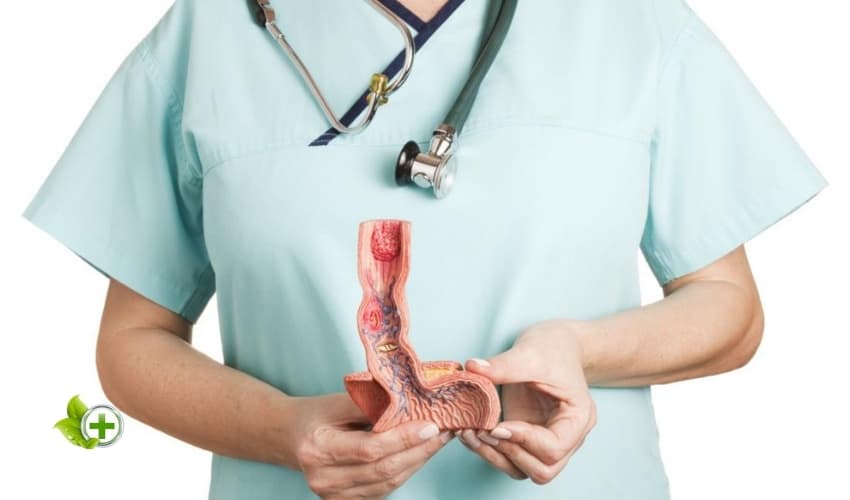
Symptoms of esophageal ulcers
The most frequent sign of an esophageal ulcer is chest discomfort. The pain might be mild or intense, and it can vary over time. Excessive exposure to stomach acid leads to long-term inflammation and irritation of the esophagus, allowing ulcers to develop.
Other symptoms can be discomfort or a burning feeling behind or below the sternum.
To help diagnose an esophageal ulcer, your practitioner will run:
- an upper endoscopy in which an endoscope is passed down the esophagus through the mouth. The inside of the esophagus will be examined while the doctor will look for abnormalities. A small tissue sample (biopsy) may be removed for examination in a lab.
Now that you know 2 of the three central peptic ulcers, let's get into detail on stomach ulcers.

Stomach ulcers
Stomach ulcers are a severe illness affecting more than 10% of the human population. Sufferers frequently experience chronic pains and life-threatening gastrointestinal bleeding or perforation due to the disease. Since the 19th century, excessive gastric juice that erodes the stomach's mucosa has been claimed to be the primary cause of a stomach ulcer.
Stomach ulcers are typically quite easy to cure, but if not treated, can become severe.

What is a stomach ulcer?
Stomach ulcers are also known as gastric ulcers and are part of the peptic ulcer group. Stomach ulcers occur when perforations or sores are formed on the stomach lining that causes severe pain.
Your digestive tract is coated with a mucus layer that usually protects your stomach wall against acid. When a break forms in the mucosal barrier of the stomach tissue lining that goes through the mucus mucosa, it can create a painful open sore that may bleed. It's critical to understand that you can prevent this illness.
Let us first learn the basics of stomach ulcers.
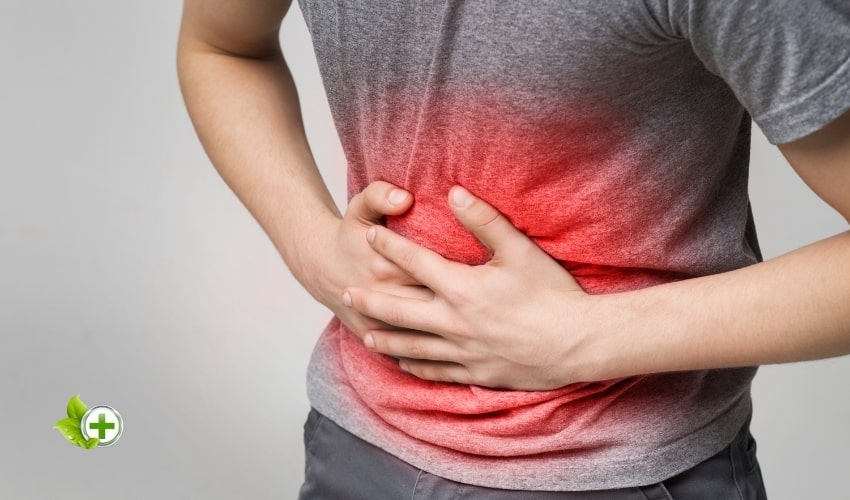
Stomach ulcer symptoms
The most frequent symptom of a stomach ulcer is a dull or painful sensation or discomfort in your mid-abdomen. The pain is generally more severe when your stomach is empty.
Acid-inducing meals may make your stomach pain and discomfort worse. It can lead to open sores in the stomach lining.
Not all stomach ulcers are painful and people can experience symptoms like indigestion, heartburn and acid reflux, and feeling sick generally.
The most common stomach ulcer symptom is a burning pain in the abdominal area and heartburn. It may come and go and the pain most often:
- Occurs when your stomach is empty. (Usually between meals or during the night).
- It may stop briefly when eating or when taking antacids.
- Lasts for minutes to hours.
- Tend to come and go for days, weeks, or months.
- Can worsen with spicy foods.
Less common symptoms may include:
- Bloating and burping.
- Poor appetite and weight loss.
- Nausea and vomiting.
- Dull pain in the stomach.
- Feeling full easily.
- Dark, tarry stools.
- Throw up that's bloody or looks like coffee grounds.
- Fatty food intolerance.

What causes stomach ulcers?
Most stomach ulcers are frequently caused by one of the following:
- Pylori bacteria infection by Helicobacter pylori (H. pylori)
- Long-term use of pain relievers (aspirin)and nonsteroidal anti-inflammatory drugs NSAIDs, commonly known as naproxen or ibuprofen.
- Zollinger-Ellison syndrome is a condition in which one or more tumors (gastrinomas) form in your pancreas or the upper part of your duodenum. These acid-producing cells secrete large amounts of the hormone gastrin that cause the body’s production of acid to increase.
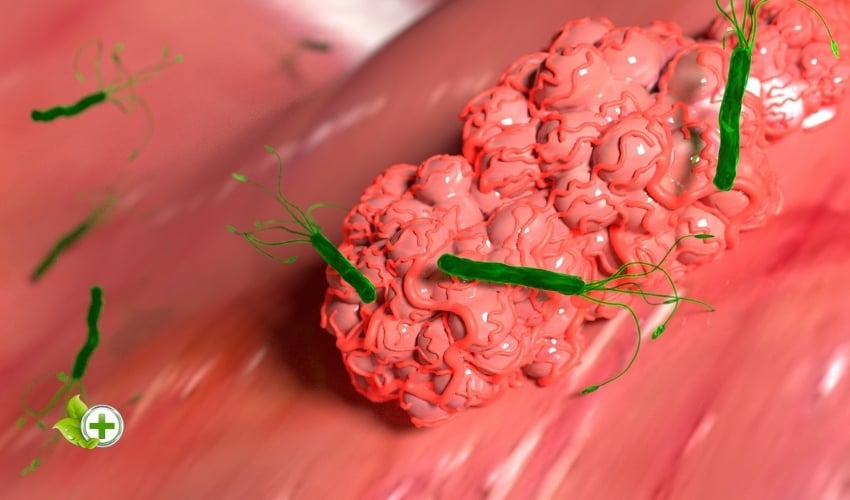
Helicobacter pylori infection (H pylori)
H pylori are bacteria that can cause stomach ulcer disease. Most people never become ill due to H. pylori infection and are unaware that they have it. If you experience indications and symptoms of a stomach ulcer, your practitioner will almost certainly test for H. pylori.
H pylori infection may spread from person to person through direct contact with saliva, vomit, or fecal matter. Individuals who are H. pylori-infected can acquire the disease in various ways:
- Through contaminated food or water.
- Living with someone already invected with has an H. pylori infection.
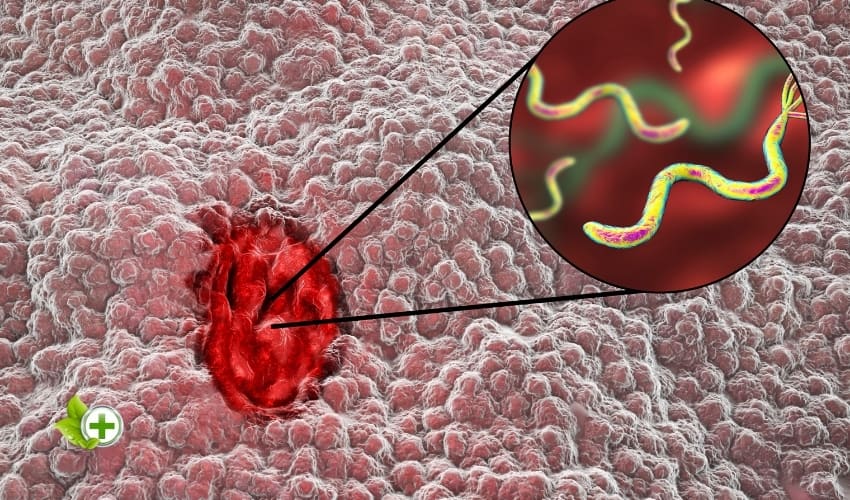
Complications of helicobacter pylori infections
Pylori infection can harm the stomach's protective lining and the small intestine's lining. This infection allows acid to cause an open wound (ulcer). H. pylori is associated with about 10% of ulcers in people.
H. pylori infection can irritate your stomach, causing it to become inflamed (gastritis) and are the precursor for developing stomach ulcers.
H. pylori infection significantly raises the risk of various types of stomach cancer.
Complications when left untreated; a gastric ulcer can result in internal bleeding. Bleeding can occur as slowly, leads to anemia or as severe bleeding that may require hospitalization or a blood transfusion. Internal bleeding and perforation can be life-threatening. When the stomach lining splits open it is known as perforation. The bacteria that lives in your stomach escape and infect the lining of your abdomen which can be life-threatening.

How to diagnose a stomach ulcer
Diagnoses will depend on all the symptoms and severity of your ulcer.
- Your health care provider will perform an endoscopy.
- A blood test to detect a bacterial infection like H pylori.
- Breath Test: by drinking a special liquid that contains urea, a lab test can show if your carbon dioxide levels are higher than normal. If so, you have H pylori.
- Stool test. Doctors will use a stool test to study a sample of your stool. Stool tests can also show the presence of H pylori.
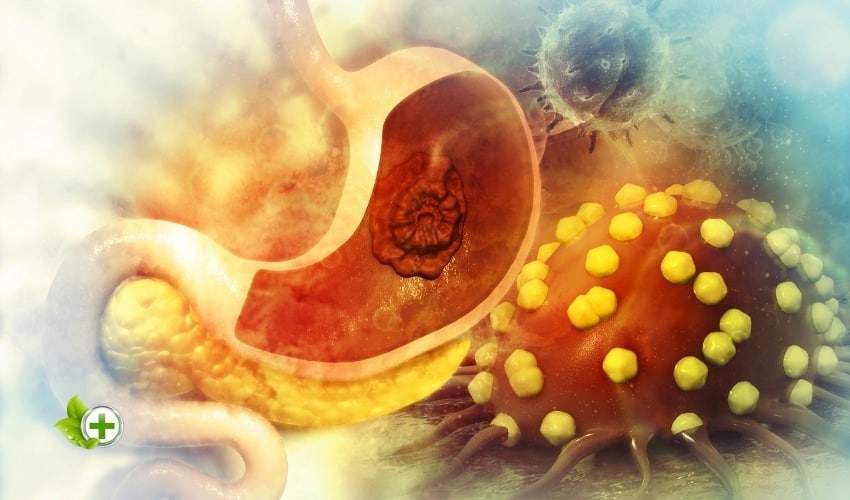
Stomach ulcer risk factors
- You increase the risk of stomach ulcers if you take nonsteroidal anti-inflammatory drugs (NSAIDs)
- H. pylori increases your risk of stomach and duodenum ulcers.
- There is little evidence that some lifestyle factors like stress, alcohol, and spicy foods cause stomach ulcers.

Can stomach ulcer causes cancer?
Occasionally, stomach ulcers can become cancerous. Vomiting blood or blood in the stool may be signs of stomach cancer. Consult with your health care practitioner immediately.

Treatments for stomach ulcers
Stomach ulcer prescription medication
Proton pump inhibitors (PPI): These drugs reduce acid, which allows the ulcer to heal. The amount of acid in your digestive system may usually be reduced with a proton pump inhibitor, allowing the ulcer to heal.
If H. pylori infection is the cause of your stomach ulcer, you may need antibiotics.
Protective medications: Like a liquid bandage, which covers the ulcer in a protective layer to prevent further damage from digestive acids and enzymes.
Your health care practitioner may prescribe drugs after an ulcer has healed. That prevents recurring ulcers by protecting the stomach lining from acid.
Patients taking medications that cause ulcers should discuss alternative pain-relief options with their practitioner. Avoid NSAIDs.
Surgical treatment can be an option to remove the damaged lining of the stomach.

Natural treatments for stomach ulcers
There are some natural treatments you can also try.
- Bioflavonoids, are an effective additional treatment for stomach ulcers.
- Flavonoids are beneficial in treating stomach ulcers via antioxidative activity.
These chemicals are chemical compounds that occur naturally in many fruits and vegetables, red grapes, kale, broccoli, apples, berries, and teas, especially green tea.
- Plain old licorice with the sweet flavor extracted. According to one study, licorice can aid ulcer healing by inhibiting H. pylori growth.
- Probiotics are live bacteria and help keep your digestive system healthy.
- Yogurt
- Miso
- Kimchi
- Kefir
- According to a review of all-natural cures, aloe vera is one of the most common natural treatments for stomach ulcers or peptic ulcers.
- Honey is far from just a simple sweet treat. Honey has about 200 components. With polyphenols and other antioxidants being among them. You may consume honey-like any other sweetener, with the added benefit of possibly soothing your ulcers if you have normal blood sugar levels.
- Garlic extract helps to suppress H. pylori growth in humans. If you don't like the flavor of garlic or the aftertaste, you may use supplements instead. Garlic is a blood thinner.
- Cranberry helps prevent acid reflux. Cranberry and cranberry extract have also been helpful against H. pylori infections. You may drink cranberry juice, eat cranberries, or take cranberry supplements. There is no exact quantity that will help you. Because of the high sugar content in cranberries, avoid overeating because it might cause stomach and intestinal problems.
Acid reflux? what foods to avoid
The strong acit is produced by the stomach to help digest food and protect against microbes.
Certain foods may irritate the lower end of the esophagus. They are known as the lower esophageal sphincter (LES), allowing acid and stomach content to back up into the esophagus.
- Try to eat 2 hours before going to bed to prevent acid reflux.
- Avoid spicy foods.
- Tomatoes and tomato-based products.
- Onions and Garlic
- Food prepared in oil.
- Milk. (causes your stomach to produce more acid and digestive juices).
- Alcohol
Foods that may relax the lower esophageal sphincter
- Coffee. (contains caffeine).
- Dark chocolate. (contains methylxanthine)
Not every food acts the same for every person. It will help to make a list of foods that seem to cause acid reflux symptoms worse. You can see a Dietician for the perfect diet plan if you prefer.
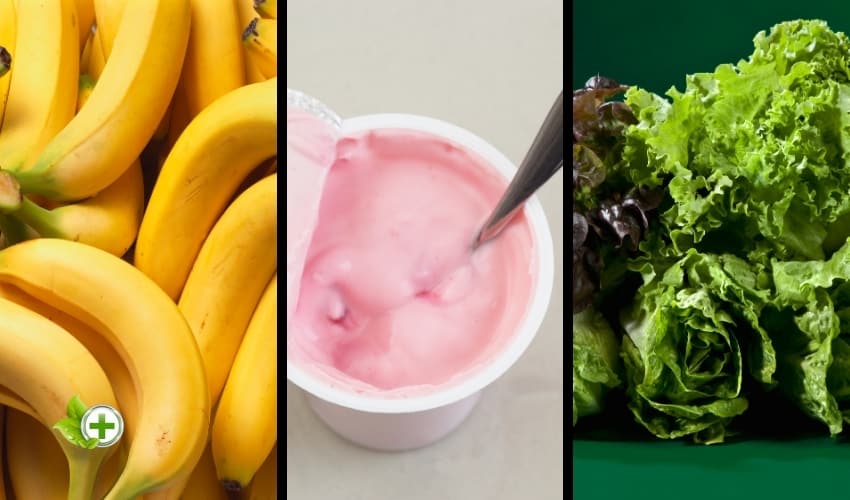
Foods that heal stomach ulcers
- Bananas
- Apples
- Cabbage
- Raspberries
- Carrots
- Leafy greens are important
- Bell peppers
- Strawberries
Seasonings and hot peppers may irritate the stomach's lining, causing stomach ulcers to worsen. Polyphenols are found in fruits and vegetables, which aid digestion by either healing the gut lining faster or eradicating harmful bacteria such as H. pylori. However, these foods may not cure all ulcers. They are nevertheless critical if you wish to support your body's natural healing process.
When you overate on the wrong food and you have a stomach ulcer that causes you pain.
Short Video
Peptic ulcer disease diet
Soluble dietary fiber reduces the risk of developing peptic ulcer disease.
Avoid any fatty foods.
Eat lots of fruits and vegetables, whole grains, and lean protein. Low-fat or fat-free dairy products will help you maintain a well-balanced diet.
Ensure that you get the recommended daily amounts of vitamins B12, C, and E as stomach ulcer treatments.
In particular, vitamin B6 and biotin, B vitamins might aid in healing ulcers. Polyphenol-rich foods and seasonings include:
- dried rosemary
- flaxseed
- Mexican oregano
- blueberries, raspberries, strawberries, elderberries, and blackberries
- black olives
Conclusion
Peptic ulcer disease is stomach ulcers, duodenum ulcers, and esophagus ulcers that can form in the stomach, small intestine, or esophagus lining. Ulcers can be caused by various infections, including Helicobacter pylori (H. pylori) infection, the use of certain drugs, and excessive stomach acid. Gastric or stomach ulcers are the most common type of ulcers. The causes of stomach ulcers vary depending on the person's age and health history.
FAQ
What are the main causes of Peptic Ulcers?
Peptic ulcers are mainly caused by Helicobacter pylori bacteria and the long-term use of nonsteroidal anti-inflammatory drugs (NSAIDs), like ibuprofen and aspirin. Other factors include stress and spicy foods, which can exacerbate the condition but are not primary causes.
What are the typical symptoms of Peptic Ulcers?
Common symptoms of peptic ulcers include a burning stomach pain, bloating, heartburn, nausea, and in severe cases, vomiting blood or passing black stools. The pain may worsen at night or when the stomach is empty and can be temporarily relieved by eating certain foods or taking antacids.
How are Peptic Ulcers treated?
Treatment for peptic ulcers depends on the cause. If caused by H. pylori, antibiotics are prescribed. For ulcers caused by NSAIDs, stopping the medication and using acid-reducing drugs like proton pump inhibitors or H2 blockers is common. Lifestyle changes, like avoiding alcohol and smoking, are also recommended to support healing.

